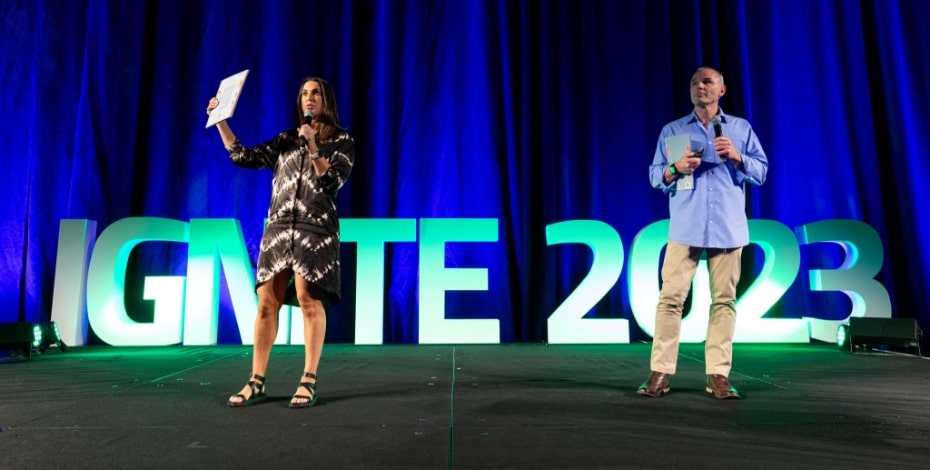
Spasticity manual at your fingertips

A digital upgrade for a popular spasticity assessment guide won the Physiotherapy Research Foundation Physio Pitchfest 2023 Judges’ Award at the APA conference last October.
Since its first publication in 2019, the Epworth Foundation’s A Guide to the Modified Tardieu Scale has become a bestseller among physiotherapists working with patients presenting with spasticity.
But now the team behind the guide, based at Epworth Hospital and the University of Melbourne, plans to take the manual online—first with a website and ultimately with an app.
‘It’s easier to have that information on your phone, your iPad or your laptop while you’re working; it’s much more user-friendly,’ says Dr Michelle Kahn MACP, a physiotherapist at Epworth Hospital and a member of the team.
The Epworth team also includes physiotherapists Professor Gavin Williams FACP, Dr Elizabeth Moore FACP, Dr Megan Banky MACP and Matt Wingfield APAM, rehabilitation physicians Professor John Olver and Dr Rose Acher and occupational therapist Jen Alford.
Last October, Michelle and Gavin successfully pitched their idea for upgrading the guide to a digital platform to a panel of judges at the Physiotherapy Research Foundation (PRF) 2023 Physio Pitchfest, winning the Judges’ Award, worth $15,000, and a one-hour mentoring session by Cohort Innovation Space.
An initiative of the PRF, Pitchfest seeks to identify innovative physiotherapy products and ideas, providing the award recipients with funding for further development and marketing.
Past winners have included SummaRise, a comprehensive falls assessment app for aged care settings developed by Daniel Hug APAM, and the One-80o Pronosupinator, a supination and pronation splint designed by Brodwen McBain APAM.
In their comments, the judging panel noted that their reasons for choosing the project included its potential to advance practice globally, a demonstrated strong clinical demand and the world- class team behind it.
They also highlighted the ability of the team to quickly digitise and update their existing product through a two-step development process, allowing them to rapidly scale up access via a website while developing the app in the background.
A Guide to the Modified Tardieu Scale grew out of a need identified a decade ago at the Epworth Hospital’s spasticity clinic to standardise the way that physiotherapists and other clinicians assessed and reported spasticity.
For example, the degree of rotational movement in joints such as the hand and wrist was reported differently by different therapists, Gavin says.
‘Does someone call that 150 or 30 degrees?
‘When it comes to the hand and wrist and fingers, it can be confusing,’ he says.
The team built up a collection of standardised assessments, which they posted on the walls of the clinic for easy reference and shared with others when teaching courses.
‘Given that we were already sharing it, we thought we needed to formalise it and that’s where the manual came from,’ Gavin says.
‘It’s been really successful—all the unis use it and all the spasticity clinics—it sold out.’
The guide is being used by physiotherapists, occupational therapists, neurologists and rehabilitation consultants working with children and adults with spasticity as a result of brain and spinal cord injuries, stroke, multiple sclerosis, cerebral palsy and so on.
In addition to clinical practice, it’s also being used for teaching purposes.
But while the second edition was recently published to meet demand, the team recognised that a digital version would provide a much richer user experience, including the use of videos to better show assessments on a range of patients.
‘Sometimes the photography had to be done so that you could see the parts of the joints being moved, which is not necessarily the handling that we would find most effective when actually doing the assessment,’ says Michelle.
‘A video can show alternative ways of doing things.
‘For example, if someone has a really painful shoulder or lacks trunk control to sit or stand upright, we can demonstrate the alternatives and show how to ensure that the assessment is consistent and repeatable.’
The Epworth team has partnered with Dr Greg Wadley, a senior lecturer in the School of Computing and Information Systems at the University of Melbourne, to design the digital platform for the guide.
Initially, it will be available as a website, with an app to follow in about a year.
‘It’s much easier to develop a website in such a way that the end user wouldn’t know that they’re looking at a website and not an app.
‘They can develop it so that whether it’s on your smartphone, iPad or desktop, it’s the same sort of user experience,’ Gavin says.
The team will collect feedback to improve that user experience prior to the release of the app.
The app also has the potential to expand to include additional features, based on research from the Epworth team.
‘Our research suggests that it is not just how you do the tests but how quickly you do them that matters.
‘We just need a little bit more evidence before we include that and other similar features in the app,’ Gavin says.
The team plans to launch the website in March 2024, once they have finished shooting the videos.
The Pitchfest award is covering a lot of the development costs and the Epworth team will make up the shortfall.
Ultimately, a small fee to download the app will be charged to cover future development costs.
As for marketing the website and app, like the book, word of mouth will be the best tool.
‘Between the team members we have been co-authors on international guideline papers and research papers and we’ve got lots of collaborators around the world to help us.
‘It’s currently free and that will help the dissemination too,’ Gavin says.
>> The 2023 PRF Physio Pitchfest was proudly sponsored by VALD Health.
© Copyright 2025 by Australian Physiotherapy Association. All rights reserved.





